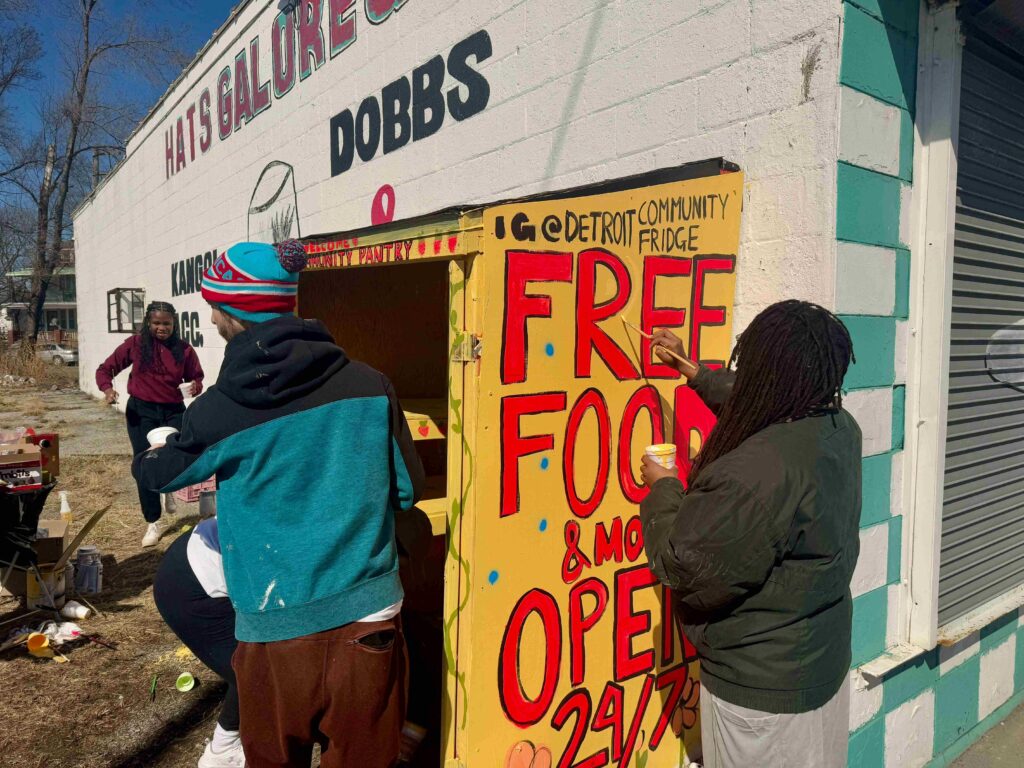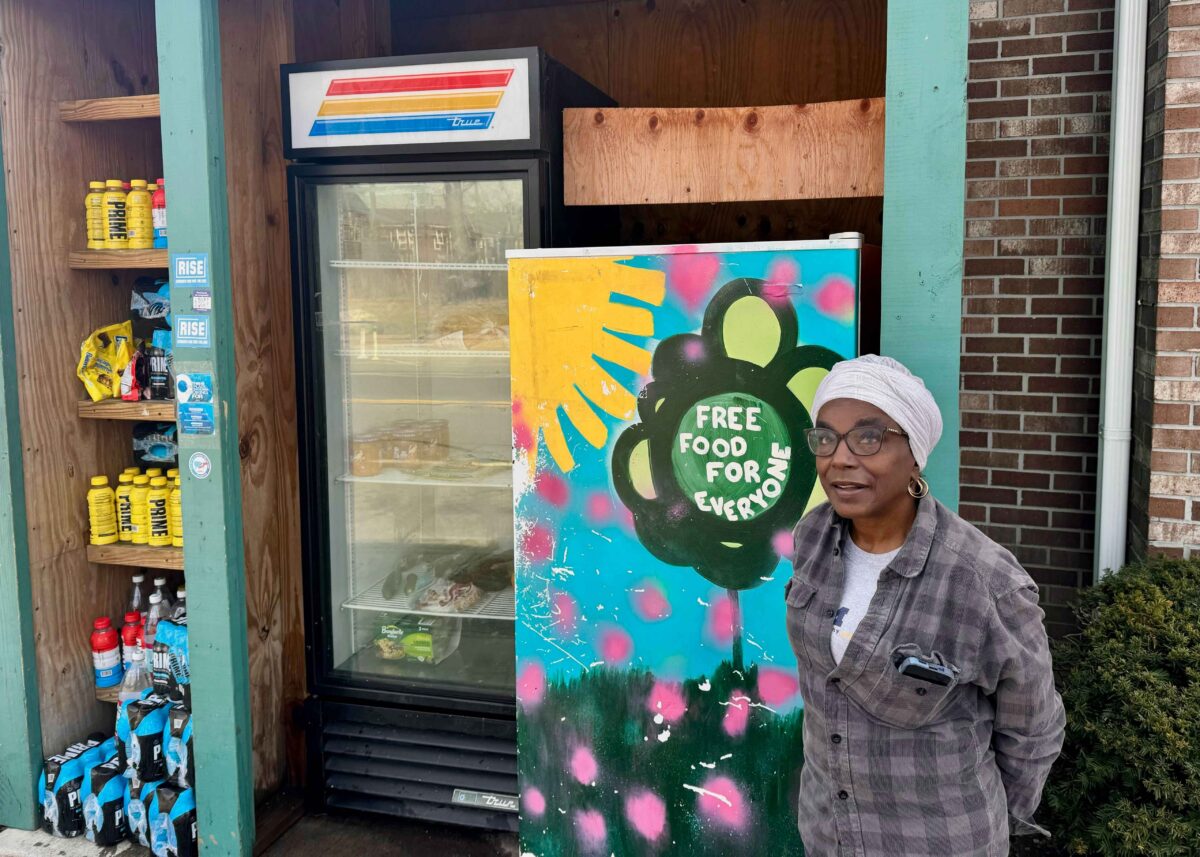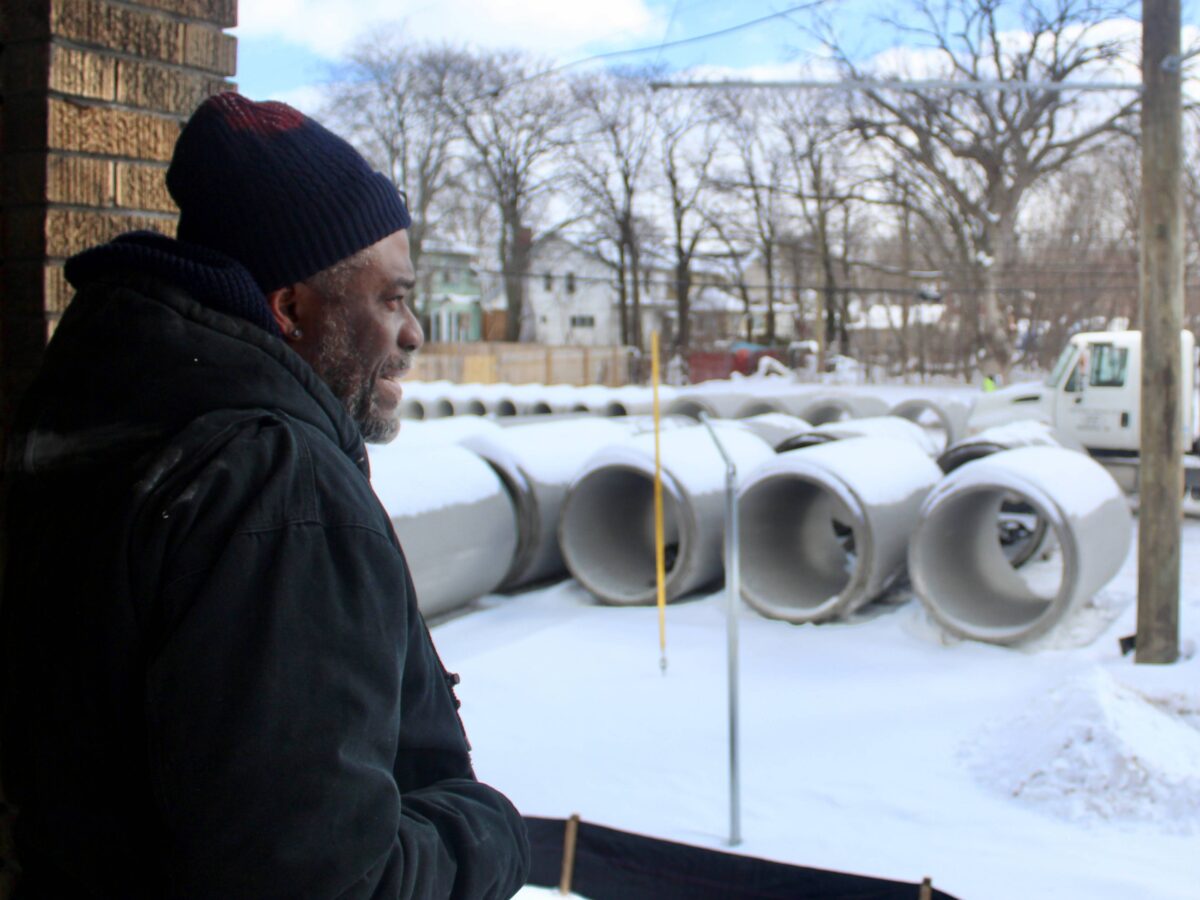Overview:
-Detroit Community Fridge, a volunteer-based mutual aid organization, bolsters six community fridges citywide to combat food shortages and reduce waste.
-Federal funding cuts to hunger relief are spotlighting the importance of community fridges and other grassroots efforts.
-"You do church in your community (by) helping others," says Belinda Gilmore, founder of the Field Street Community Fridge.
Belinda Gilmore didn’t feel particularly called to distribute food, but when the opportunity came to help her church share produce and canned food with residents in Detroit’s Islandview neighborhood, she took on the responsibility.
It didn’t take long for Gilmore, a retired social worker, to envision her work as an ad hoc food ministry, in part because of the teachings of her pastor.
“You attend church to commune with the other people around you and hear the word, but you do church in your community, helping others,” Gilmore, 74, told Planet Detroit.
Over time, she made a routine out of driving twice a week from her home on the city’s east side to Northville to pick up boxes of groceries from big box retailers. From there it ballooned to truckbeds of food. When it became apparent the food ministry could no longer operate out of her church’s parking lot, Gilmore found a vacant property that could double as a 24/7 site for residents in need of food or clothing.
Roughly five years later, the Field Street Community Fridge is a neighborhood staple, welcoming locals to take or leave donated groceries at their own discretion. It’s among a patchwork of community fridges and pantries that have sprouted across the city and nation since the onset of the COVID pandemic, and continue to be stocked by mutual aid networks, food rescue operations, community organizations, and passersby.
As food costs have surged, more people have turned to food banks and mobile distribution sites to supplement their increased grocery bills. But now, with the looming threat and application of federal funding cuts to hunger relief agencies, it’s given more weight to how community fridges and other grassroots efforts can stave off potential food supply shortages and redirect surplus food from landfills.
“We’re scrappy, and it’s exciting to see the creativity that comes out of that,” said Kazza “Kitchen” Kitchell, a lead organizer with Detroit Community Fridge, a volunteer-based mutual aid organization started in 2020 that supports Field Street and other fridge locations.
“It makes my life better when we’re all fed and to know that if I’m down bad, I have a resource and an infrastructure that hopefully becomes more and more supportive and more sustaining.”

AnJel “AnJelic” Mantel, right, paints the Gratiot Community Fridge. Photo by Ethan Bakuli.
‘I’m glad you’re all still here’
On a bright Sunday afternoon in early March, Kitchell and a handful of volunteers arrived at Hats Galore and More on Gratiot Avenue to help paint one of the Detroit Community Fridge’s food pantries. The site has faced some challenges over the last year, whether due to stolen shelves or fridges, trash buildup, or limited supplies.
The space will also have a fridge, Kitchell said, but for the time being, the volunteer crew loads the newly renovated pantry shelves with nonperishable goods such as rice packets, canned beans, SpaghettiOs, and powdered milk.
Mike, a 50-year-old Detroiter who grew up near the hat shop and said he stops by the pantry often when it’s stocked, greets Kitchell.
“I’m glad you’re all still here,” Mike, who declined to share his full name, said. Before the crew is done with its finishing paint touches on the pantry, Mike picks up a freezer bag full of goods before he catches the next bus downtown.
Food distribution is nothing new, but the organizers of Detroit Community Fridge see their work as being in line with mutual aid networks such as Food Not Bombs, that aim to circumvent the bureaucracy and red tape of charity models and promote community self-sufficiency.
“It’s autonomous, it’s 24/7, and it’s as local as can be,” said Kitchell, who uses they/them pronouns. “It gives people choices in a way that’s not always offered to people seeking food.”
Since its beginnings, the network now supports six fridges spread out across Southwest Detroit and Detroit’s east side. Each location varies in traffic, and the community fridge network is not without its challenges, but Kitchell said the project has empowered residents to “create something in the world that we all need and that is done with little resources, comparatively to a nonprofit.”
For Gilmore, the idea of partnering with Detroit Community Fridge was simple.
“We had all started from nothing,” she said. “All we had was similar interests and similar goals.”
The Field Street Community Fridge came to life through collaboration between Gilmore and local businesses. Islandview, where Gilmore resides, is located in the 48214 zip code, which has some of the highest rates of food insecurity in the city.
When Gilmore meets somebody new, she’s quick to ask whether they have anything to donate to the community fridge. The fridge has redistributed surplus food from Trader Joe’s and Sam’s Club and received technical assistance from local businesses such as Planted Detroit and Sister Pie.
“That gave the fridge access to fresher foods, which is what our community needs,” she added.
Joy Bass, a McDougall-Hunt resident who regularly distributes goods to the Field Street Community Fridge, said it’s helping people.
“It’s helping others, not just the less fortunate, but anybody that wants to come up here and get whatever they want, bring something, drop something, and take some with them.”
While Google searches for terms such as “community fridge” and “mutual aid” saw a national spike in interest in the spring of 2020, neither phrase has remained popular. Instead, search results for “free food” and “food bank” routinely see high national engagement over the last five years.
MORE REPORTING FROM ETHAN BAKULI
‘I’m still not on board’: Can GLWA’s new pump station design win over Jefferson Chalmers?
The Great Lakes Water Authority’s proposal for a five-story pump station in Detroit’s Jefferson Chalmers neighborhood, designed to blend with nearby structures, faces opposition from residents calling for better community engagement and information sharing.
Jefferson Chalmers residents say they were left out of GLWA’s $138M pump station project
The Great Lakes Water Authority says new pump station will improve stormwater management and prevent flooding, but residents contend the project was pushed through with little public input.
Residents share flood lessons as Great Lakes Water Authority tackles crisis
The Great Lakes Water Authority and the U.S. Army Corps of Engineers are collaborating on a multi-year study to explore flood management in Southeast Michigan, inviting public input to shape their findings.
National nonprofit plans 2 more local community fridges
Among the organizations partnering with Detroit Community Fridge is Detroit Heals Detroit, a youth-led group that focuses on addressing collective trauma. In 2020, the group opened a “healing hub” in Detroit’s 48205 zip code, providing a space for local residents to gather, seek shelter, and access resources.
“When it comes to community building, food is one of those foundational connectors,” said Camille Hollenquest, executive director of Detroit Heals Detroit.
“There’s a lot of relationship building that comes with meeting those vital needs and I think in line with everything that we do, we’re making sure that we’re keeping in mind the hierarchies of need.”
Since installing a community fridge and pantry at their hub, Hollenquest said, Detroit Heals Detroit has seen an outpouring of interest from locals driving or walking by. Grocery stores like Aldi’s or Meijer are in the neighborhood, but those options are “really only accessible by car or by bus.”
Right now, the community fridge network is not self-sustaining, said Detroit Community Fridge’s Kitchell.
“It’s a band aid” until major systemic changes can transform the U.S. food system, they said.
“We need to build infrastructure, and imagine ways of doing that that don’t rely on systems we’re familiar with.”
For many of the organizers participating in the community fridge network, the program’s lack of entry barriers has enabled them to envision other alternative projects, such as installing charger stations, creating adjacent community gardens and or partnering with commercial kitchens to prepare meals.
Darraugh Collins, site leader of the Detroit chapter of Food Rescue US, acknowledges the food redistribution ecosystem as it stands has room for improvement. The nonprofit annually transports fresh food surpluses from local retailers and businesses to community fridges, food pantries, and other social service agencies.
“(Nonprofits) are still too siloed in many ways and for me it’s about encouraging us all to make sure that we are inviting and extending the hand to people that need to be at the table,” said Collins.
“Sometimes that doesn’t happen when there’s a lot of layers and there’s politics and bureaucracy. We don’t allow progress to flourish, and I think that that is something we need to ensure is happening for a city to ultimately be healthy and for our communities to be healthy, strong and vibrant.”
The Detroit chapter of Food Rescue US is preparing to introduce two new community fridges “below Eight Mile,” Collins added, either in Detroit, Highland Park, or Hamtramck.
“We want this to be a community driven decision, and so we put it out to the community to hear from them about where they feel a fridge is needed,” she said.
Community fridges in a time of disappearing safety nets
As news of trade disputes between the United States and its longtime allies and federal funding cuts to social service agencies contribute to long-term uncertainty for food-insecure parts of the country, it’s elevated dialogue about how communities can produce productive alternatives to supply chains.
“It seems like people are having more conversations than they did two weeks ago, because it’s like all of a sudden things that you thought were just a given are being taken away, and you didn’t even know that you needed to fight for those things,” said Katherine Alaimo, an associate professor at Michigan State University, whose research focuses on food justice, community food insecurity, and urban agriculture.
Community fridges or gardens, Alaimo says, will not solve issues like hunger in America, but they can lead to those “important conversations” about local and federal economic policies such as livable wages, universal health care, or a strengthened food stamps program.
“Food is not the solution to food insecurity,” said Alaimo. “There’s so much economic support that needs to happen. Childcare, transportation, all of the things that people need to support their daily lives will help them be able to afford food.”
Islandview’s Gilmore envisions a future where the property adjacent to the Field Street Community Fridge can be a community store and offer job training for local residents.
Hollenquest said she views the community fridge and other efforts made by Detroit Heals Detroit as moving away from a model of charity to a practice of mutual aid. The community organization aims to launch a community garden next year and to build more partnerships with local convenience stores, encouraging them to sell more fresh produce and basic pantry items residents need.
“We’re noticing that the safety net was really more of like a safety napkin,” Hollenquest said. “It’s becoming less and less of something that exists … now you have to be more methodical on how you survive.”
Hollenquest added: “There is an abundance of community that is available to provide support, and I think especially as Black people, and as a predominantly Black organization, we’ve been through the struggle. We know what scarcity feels like.”
“If we can all pull together, there should never be a need unmet.”
Detroit community fridge locations, contacts:
- Bridging Communities Community Fridge, 6900 McGraw Ave., 313-361-6377
- Santos Church Fridge Community, 1953 Military St., 313-327-2141
- Field Street Community Fridge, 1812 Field St., belindajean9@gmail.com
- Georgia Street Community Collective Fridge, 8902 Vinton Ave., georgiast313@yahoo.com
- Detroit Heals Detroit Community Fridge, 19510 Alcoy Ave., 313-403-8374
- Gratiot Community Pantry, 10061 Gratiot Ave., kazzakitchell@gmail.com




